Orunmila (Orula): The Great Fortune Teller of Ifa
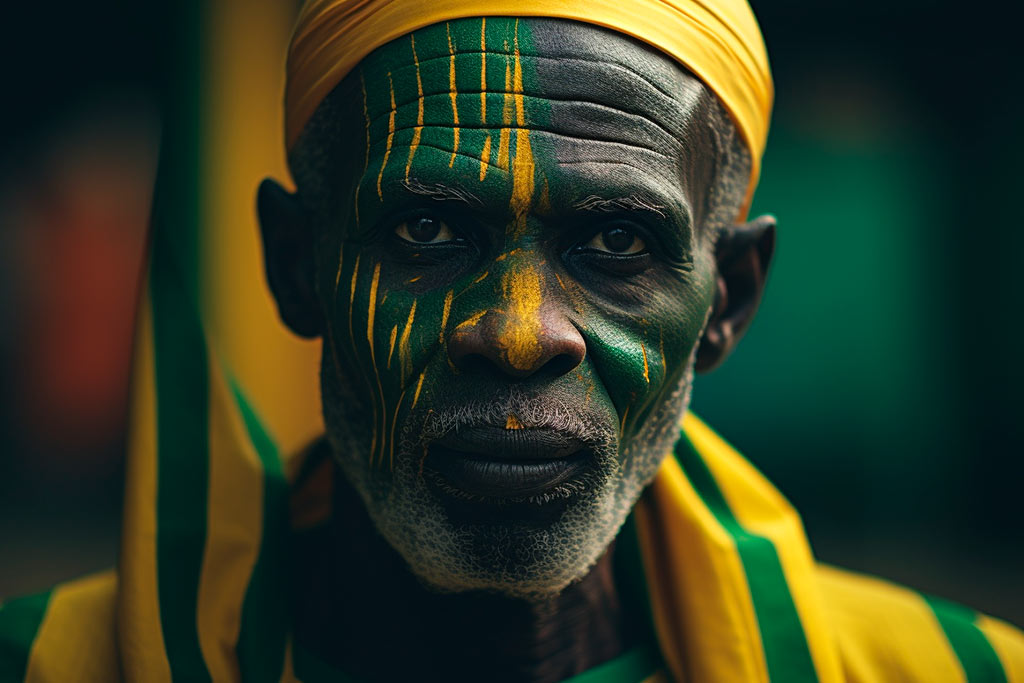
Orunmila, also known as Orula, is not only a symbol of wisdom and prophecy in Yoruba mythology, but also the only witness of creation according to tradition. This revered orisha, endowed with exceptional intelligence and wisdom, is the guardian of the Ifá divination system and a great prophet. His deep knowledge of destiny and ethics makes him a central figure in the understanding of life and spiritual paths in Yoruba culture.
Wrapped in mystery and power, Orunmila not only possesses the secret of the interpretation of the Oracle and the signs of Ifá, but is also the pillar of a wisdom transmitted through generations. His story and teachings continue to be a beacon of light in spiritual guidance and ancient knowledge, revealing the laws that govern the universe and the unique ability to influence human destiny.
Importance and Role in the Yoruba Religion:
Within the rich Yoruba mythology, and extending to the practices of Santeria, Orunmila emerges as an emblematic figure, an orisha who symbolizes not only wisdom and divination, but also the very essence of understanding and morality.. His presence in these traditions is so fundamental that his influence extends to almost every aspect of the life and spirituality of his followers.
It is said that he was present in shaping the destiny of each being before their birth, giving him deep and unique knowledge about the secrets of the universe and the future. This ability makes him an indispensable advisor, a guide for those seeking to better understand their path and purpose in life.
Beyond his role as a fortune teller, Orula is a teacher of ethics and wisdom. Through the Ifá odus, he transmits teachings and advice, offering guidance on moral issues and life decisions. These odus are not only divination tools, but also sources of wisdom that address universal themes such as justice, love, conflict and harmony.
In Yoruba practice, Orunmila is revered not only for his ability to foresee the future, but also for his role as guardian of ancestral wisdom. The Ifá priests, known as Babalawos, are his followers and custodians of his teachings, dedicating their lives to interpreting the signs and keeping alive the connection with this orisha of profound wisdom.
The relevance of Orunmila transcends the religious sphere, influencing the culture, ethics and social practices of the Yoruba communities. Her figure symbolizes the constant search for knowledge and understanding, reminding us that in wisdom and deep reflection we find the answers to life's enigmas.
Who is Orunmila?

Orunmila, venerated in the Yoruba religion and Santeria, is a deity of immense wisdom and power. Known as the orisha of divination and prophecy, his figure transcends the mere concept of a divine being; He is the symbol of ancient wisdom and spiritual guidance. Orunmila is the repository and transmitter of Ifá, a divination system that uses a set of signs and symbols to reveal the gods' messages to humanity.
Also called Eleri Ipin, which means "witness of all creation", Orunmila possesses all the divination secrets of Ifá. It is he who, through divination and sacrifice, was able to defeat death and helps his devotees to free themselves from adverse situations of destiny through ebo and specific recommendations prescribed in the Odu (Signs) of Ifá.
Orula is the holder of the Opon Ifá or Ifá Board, delivered by the Orisha Shango, along with the mysteries of divination. In Afro-Cuban tradition, Orunmila is also said to have the gift of healing, employing the use of herbs to heal the sick. He is the owner of the cardinal points, North, South, East and West, represented on the divination tray and invoked when using it.
The exact meaning of his name is not known, although there is a theory that believes that it is a contraction of the words Orun (Heaven), Ami o mi (Sign, omen, prophecy) and la (Appears like the sun); That is to say that in theory Orunmila means: "The prophet of Heaven who appears like the Sun."
In some Yoruba tribes, Orunmila is known as Ibikeji Oloddumare, which translates as "next in hierarchy after Olodumare.". Its importance in the Yoruba religion cannot be underestimated. He is considered the advisor of the gods and the protector of spiritual knowledge. His presence is invoked in times of uncertainty and crucial decisions, as he is believed to hold the key to understanding destiny and the complexities of human life.
Other Names of Orula and their Meaning:
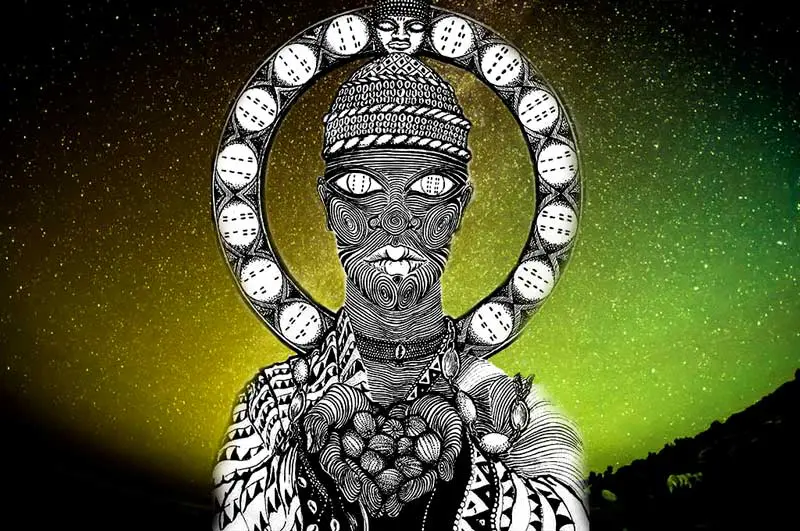
Orunmila (Orula), is venerated under various names that reflect his various facets and attributes. Each name carries with it a deep meaning, revealing different aspects of its nature and its influence on the Yoruba religion and Santeria. Below, we explore some of these names and what they represent:
- Okunrin Kúkúrú Oke igeti: the man from the Igeti hill.
- Alaquentu: the skilled doctor who founded and became king of the city Ipetu.
- Adi-fa-fun: The one who sits on the mat to guess the past, the present and the future.
- A-da-fun a-lu-mo: He who sits on the mat, moves the palm nuts and knows the future.
- gboye gborun: The one who lives between Heaven and Earth.
- Akéré-finú-sagbón: the man with a mind full of wisdom.
- Amai matan: the incomprehensible.
- Agiri-ile ilagbon: the wise man who speaks from the house of wisdom and knowledge.
The Birth and Origins of Orunmila
The origin of Orunmila in Yoruba mythology is as fascinating as it is mysterious, intertwined with the very creation of the world and the arrival of the orishas to earth. According to Yoruba beliefs, the orishas used the energy of an Odu of Ifá, a divinatory sign, to reach the earth. In the case of Orunmila, it is said that he came through the sign Baba Ejiogbe, marking its presence at the very moment of creation.
The story goes that Olodumare, the supreme deity in the Yoruba religion, after creating the earth, decided to send the deities to it so that human beings would know of their divine existence. The first envoys were three deities: Agbon, who represents wisdom; Imo, knowledge; and Hey, the understanding. However, these messengers were rejected by the inhabitants of the earthly plane and were forced to return to heaven.
After a period of reflection, Olodumare opted for a second attempt, sending the messengers back to earth. During their descent, they pronounced the words "OOOOOOOh, Ro, Emi and Ela." This act symbolizes the unification of the three deities, giving rise to the Orisha of Wisdom and Divination. The contraction of the words «O-RO-EMI-ELA» gives rise to «Orunmila», which in terms of pronunciation and meaning is interpreted as: «Wisdom, knowledge and understanding are the essence of the universe or existence«.
This story not only highlights the importance of Orunmila in Yoruba cosmogony, but also reflects his central role as a bearer of wisdom, knowledge and understanding, fundamental elements in the life and spirituality of his followers.
Earthly Representations of Orunmila:
Within the practice of Ifá, there are certain symbolic representations that embody the presence and spirit of Orunmila on earth. These manifestations are fundamental in the connection between Ifá followers and this powerful orisha.
- Ogunda Yekun: This Ifa sign is considered the representation of Orunmila on earth. By placing Ogunda Yekun on the ground within an atena (a ritual space), Orunmila is believed to manifest in person. This practice symbolizes the direct and tangible presence of this Orisha in Ifá ceremonies and rituals, offering guidance and wisdom to his devotees.
- Oyekun Ogunda: This Odu refers to the birth of Ifá spirituality. It represents the spirit of Orula personified, an embodiment of her divine essence and his role as spiritual guide. Oyekun Ogunda symbolizes the deep connection between Orunmila and his teachings, reinforcing his role as the orisha of wisdom and divination.
These representations are not only fundamental in religious practice, but also offer a deeper perspective on the multifaceted nature of Orunmila and his connection with the followers of the Yoruba religion.
Orunmila history
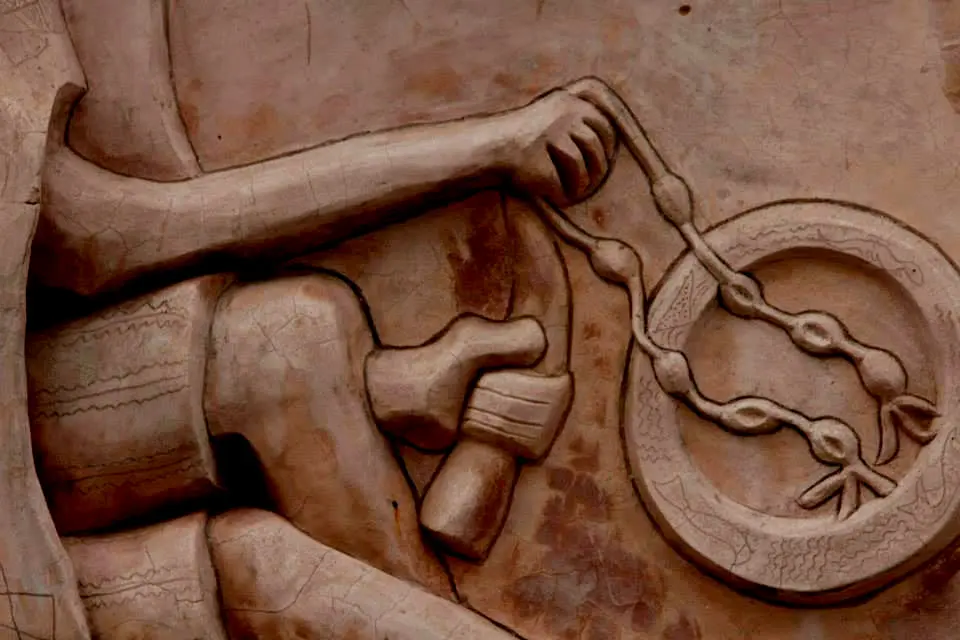
Orunmila's life is marked by stories of precocious wisdom and extraordinary abilities. From her birth, she proved to be exceptionally intelligent, exhibiting abilities unusual for a child her age. At age five, she began to manifest her prophetic powers, surprising her parents by predicting who would visit them and for what purpose.
As he grew up, Orunmila delved into the world of spells and medicine, attracting the attention of his community. She initially used sixteen small seeds to perform divinations, astounding her clients with the precision with which she identified their problems and anxieties. His fame grew quickly, but he also generated unrest among the local rulers, who finally decided to expel him from the town.
Orunmila undertook a journey that took him across the Niger River, passing through Benin, Owo and Ado, until finally settling in Ile-Ife. In this city he found the ideal environment to practice his profession as a fortune teller, gaining unprecedented fame. Even King Oduduwa came to him for advice.
Orunmila's influence in Ile-Ife was so significant that he is said to have persuaded the population to abandon the Yoruba practices of wearing facial marks. His reputation grew so much that many desired to be initiated by him into the art of Ifá. However, Orunmila selected only 16 individuals, who are known as the Apostles of Orunmila or Odu of Ifa.
Divination Instruments and Tools
The practice of divination in the Yoruba religion, especially in the Ifá system, is an integral part of the connection between human beings and the spiritual realm.. This practice not only seeks to predict the future, but also to offer guidance and wisdom for everyday life. At the heart of this process are various instruments and tools that are essential for performing divination ceremonies and rituals. These objects are not merely physical; They are imbued with spiritual meaning and are treated with great respect and reverence.
Each tool has its own purpose and symbolism, and together, they facilitate communication between Orunmila, the orisha of wisdom and divination, and his devotees. Through these instruments, the messages of the orishas are interpreted and transmitted, providing guidance and advice to those who seek their wisdom. Below, we will detail the key instruments and tools in Ifá divination, emphasizing their relevance and unique contribution to this venerable spiritual practice.
The Ikines: Sacred Seeds of Divination in Ifá
The Ikines are considered the most important instruments in the practice of Ifá, being indispensable for the priest of this tradition. These palm seeds, also known as Adele, are used in a divination process called atefar. According to tradition, palm seeds are the only means of communication that Orunmila left for the practice of Ifá.
Furthermore, through the Ikines, this Orisha receives the attention, sacrifices and offerings made to him by his believers. Iwori Meji, one of the Ifá signs, reveals that Orunmila left the Ikin as his representative before the Babalawos, the Ifá priests.
The History of Orunmila and the Ikin
In the early days, Orunmila had eight children and they lived in a land called Aido Inle. There, she taught them the art of divination. After instructing them, she decided it was time to return to heaven. Some time later, Orunmila came down to earth for an important ceremony in honor of the deity Awede Shato. All of his children came and knelt in front of him as a sign of respect, except the youngest son, Ologo, who refused to kneel.
This attitude caused great sadness in Orunmila, who immediately returned to heaven. This event unleashed chaos on the land, with infertility, crop failures, droughts, and pestilence. The inhabitants and Orunmila's children begged for his return. Upon reaching heaven, Orunmila's children found her father in front of a palm tree, holding 16 seeds and 16 pieces of ivory.
Orunmila told them that he would not return to earth, but he gave them the 16 seeds, the Ikines, telling them: "I will not go down any further, but you must use these seeds to divine, because they will be my representation on Earth."
This story highlights the importance of the Ikines in the practice of Ifá and reflects the deep connection between Orunmila, his teachings and his followers, perpetuating his legacy through these sacred instruments of divination.
Opele or Ekuele: Divination Chain
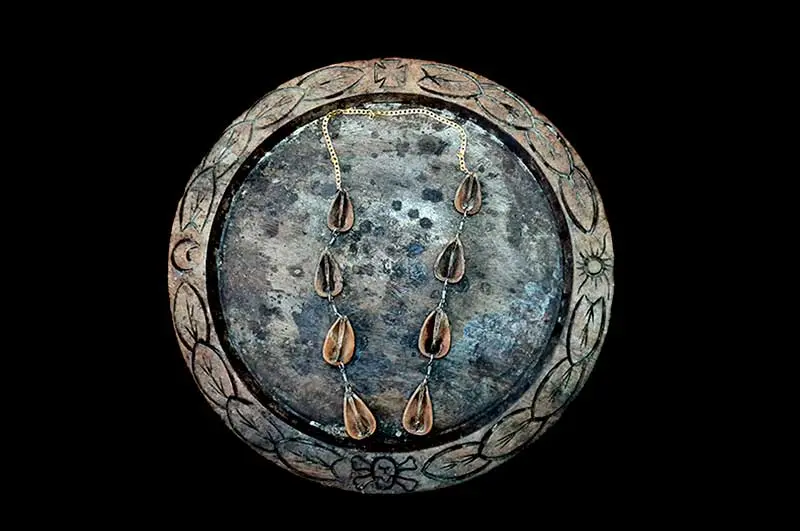
The ópele, also known as ekuele, is the second most important tool in the practice of Ifá divination, after the Ikines. This instrument is composed of eight Okpele shells, although in some variants coconut shells are used. Depending on the Ifá odu, the material of the ekuele may vary. The shells are joined by chains, arranged in such a way that there are four on each side.
The opele is used in Ifá consultations, being thrown by a Babalawo on the Ifá Board or on a mat. The way the shells fall and their disposition when thrown are interpreted by the Babalawo to reveal messages and spiritual guides.
Ifá board
The Ifá Board is a wooden tray used in divination. Its most common shape is circular, although it can also be semicircular or rectangular, depending on its specific use. Many boards are decorated with carvings, which vary according to tradition. In the traditional version, an Eshu is often included on the back, while in the Afro-Cuban version, a sun, a moon, a cross and a skull are carved, representing the cardinal points.
iruke
The Iruke, known as the cow's tail in the Nigerian tradition and the horse's tail in the Afro-Cuban tradition, is another essential instrument in the practice of Ifá. The Babalawo uses it to scare away death, moving it from one side to the other during rituals.
This instrument is mentioned in several Ifá verses, which highlight its importance and symbolism. An example of this is the following verse:
«Let us crash gégé against gégé
It was the name of the resident Awo of Alákòókó
The snail is not very enthusiastic about heating itself with fire
A hawk cannot pick up an owl for transport
Three Olúwo, six cow's tails
The war that was made with spears
That it was impossible to do
What Èdú did, Òrúnmìlà used it to destroy the conspiracy
The war that was executed with a spear
That it was impossible to execute
What Èdú did, Òrúnmìlà used it to destroy the conspiracy
Cow's tail was what Èdú used to break the conspiracy
Break the conspiracy of death
Break the conspiracy of affliction
Break the conspiracy of litigation
Break the conspiracy of loss
This verse illustrates the importance of Iruke in Ifá practice, symbolizing protection and breaking negative conspiracies.
Irofa: The Rod of Authority
The Irofa, also known as the rod of authority, is an essential tool in the practice of Ifá. Its main function is to certify and reinforce the actions carried out during divination or in the performance of ebbo (rituals and sacrifices). The Irofa is used by gently tapping the Ifá board while chanting or praying. This act symbolizes the invocation of the spirituality of Orunmila, reinforcing the connection between the Babalawo and divinity.
The Irofa can be made of different materials, depending on the indications of the Odu of Ifá. Some common variants include deer chubs (Agbani) or carved wood. In certain Odu, it is recommended that the Irofa be carved in ivory, bronze or other materials, each with its specific meaning and purpose.
Iyefa, Ashe of Orula
Iyefa, also known as Orula's Ashe, is a divine powder used on the Ifá board during divination. This powder is essential for drawing the symbols that identify the different Odu. Iyerosun is the most commonly used type of powder in this process. It is obtained from the osun tree and mixed with other materials recommended in the Ifá signs.
The Iyefa not only serves to trace the signs on the board, but also acts as a medium through which the orishas' messages are manifested. Its use is a crucial aspect in the practice of Ifá, since it facilitates the interpretation of the Odu and helps to reveal divine guidance and advice.
Symbols and Colors Associated with Orunmila
The colors associated with Orunmila vary according to tradition and region, but each one carries with it a deep symbolism. In the Afro-Cuban tradition, the representative colors of Orunmila are green and yellow. These colors symbolize fundamental aspects of life and death, concepts intrinsically linked to the wisdom of Orunmila.
- Verde: This color represents the vitality and freshness of the leaves of the trees, symbolizing life in its fullness and vigor. Green is a constant reminder of the renewing nature of life and the ever-living presence of Orunmila in the natural world.
- Yellow: On the other hand, yellow represents the leaves when they dry, symbolizing death or the end of a cycle. This color reflects the acceptance of death as a natural part of existence and the belief in Orunmila's ability to defeat death, offering wisdom and guidance in the transition between life and death.
In Nigeria, the use of colors such as terracotta and light green is common, which also have specific meanings in Yoruba practice. These colors not only adorn the altars and sacred spaces dedicated to Orunmila, but are also present in the clothing and other elements used in rituals and ceremonies.
The choice of these colors is not arbitrary, but is deeply rooted in the symbolism and teachings of Ifá. Each color represents different aspects of life, death, and wisdom, reflecting the complexity and depth of Orunmila as an orisha of divination and knowledge.
Sacred Herbs of Orunmila (Ewe)
In the practice of the Yoruba religion, sacred herbs, known as "Ewe", play an essential role. These are not mere plants; They are considered carriers of spiritual energy and are fundamental in rituals and offerings to Orunmila. Below is a list of some of the most significant herbs associated with this orisha:
- Purple Bonus
- Petite Basil
- Arabic
- Altea
- Will plow
- Noodle vine
- Neighborhood
- Copy
- Coconut Bark
- Gallant of the Night
- Paradise
- Ceiba
- Yam
Each of these herbs has its own meaning and use in Yoruba practice, being key elements in the connection with Orunmila and in the performance of rituals and ceremonies.
Orunmila Day of Celebration and Syncretism
Orunmila, a deity venerated in the Yoruba religion and Santeria, has a special day of celebration that reflects an interesting cultural syncretism. This syncretism is an example of how religious traditions can merge and adapt in different cultural and geographical contexts.
Syncretism with Saint Francis of Assisi
In the context of Santeria, a religion that developed in the Caribbean through the fusion of Yoruba beliefs and Catholicism, Orunmila is syncretized with Saint Francis of Assisi. This association is not coincidental, since both share attributes related to wisdom, connection with nature and a spirit of humility and service. Saint Francis of Assisi, known for his love for all creatures and his dedication to poverty and simplicity, reflects aspects of wisdom and spiritual guidance that are central to the figure of Orunmila.
Celebration on October 4
Orunmila Day is celebrated on October 4, coinciding with the festival of Saint Francis of Assisi in the Catholic calendar. This date has become a moment of special significance for followers of Orunmila, both in the Yoruba religion and in Santeria. During this day, various rituals and offerings are made in honor of Orunmila, seeking guidance and blessings from him. Devotees can participate in special ceremonies, make offerings of food and symbolic objects, and gather to share stories and teachings related to Orunmila. This day is also an opportunity to reflect on Orunmila's teachings, especially as they relate to wisdom, destiny and ethics.
Orunmila and Ifá
The relationship between Orunmila and the Ifá divination system is fundamental in the Yoruba religion. Through the verses and teachings of Ifá, deep aspects of Orunmila's life and character are revealed. An illustrative example of this is found in the verse of the Ifá Sign Ogbe Weña, which narrates a significant stage in Orunmila's life:
Ogbe Weña verse:
«Èyìn làá wò sorò, Adifafun Òrúnmìlà, Níjó omo aráyé yíò ma ko Baba lá kò bú, Èyìn làá wò sorò, Adifafun Òrúnmìlà, Níjó omo aráyé yíò ma ko Baba lá kò yìn, K ò yìn, Wón ní kí rú'bo, Ó "rú'bo."
Meaning:
This verse teaches us about the importance of reflecting before acting. He tells how, at first, people despised and humiliated Orunmila. However, through her wisdom and the practice of Ifá, Orunmila managed to transform contempt into respect and devotion.
When Orunmila consulted Ifá on how to handle abuse and humiliation, Ifá advised him not to pay attention to the insults and to move forward with the promise that those who despised him would eventually come to him for guidance. Orunmila, faithful to the teachings of Ifá, faced adversity with dignity and patience.
The verse continues:
"Ifá, bi wón bá mbú mi, Ìwo ni, Enìkan ò bú mi béè rí."
Traducción:
«Ifá, it is you who allows people to abuse and ridicule me. No one has treated me like this before.»
And finally, when the situation changed and those who had mistreated him began to respect and honor him, Orunmila expressed his gratitude to Ifá:
"Ifá, bi wón bá yìn mí o, Ìwo ni, Enìkan ò yìn mi béè rí."
Traducción:
«Ifá, now people are praying to me, And it is because of you, Nobody had prayed to me before in this way.»
This story not only reflects Orunmila's resilience and wisdom, but also the deep connection between his life and the teachings of Ifá, demonstrating how faith and perseverance can transform adversity into respect and honor.
Offerings and Adimuses to Orula
Offerings (adimuses) to Orunmila are a crucial aspect in the practice of the Yoruba religion and in the veneration of this Orisha. These offerings vary depending on the Odu of Ifá and the specific circumstances of each consultation or ritual.
Sacrifices to Orunmila:
Orunmila usually receives animal sacrifices as part of the rituals. The most common include:
- black chivas
- Black chickens (although, depending on the Odu, they can be yellow or white)
- Palomas
In particular situations and after a detailed analysis of the Odu of Ifá, other animals such as goats, cows or rams can be offered.
Adimu to Orunmila:
An adimu is a special offering made to Orunmila to earn his favor or thank him. Some of the common offerings include:
- 16 balls of mashed yam, placed in front of the Orunmila foundation on a taro leaf (Ewe Ikoko).
- Prawns
- white snapper
- Yam
- Various fruits
These offerings are made with respect and following the instructions of the Odu of Ifá, reflecting the deep connection and respect that practitioners have towards Orunmila. Each offering has a special meaning and is believed to strengthen the relationship between the faithful and this Orisha, facilitating communication and the reception of his wisdom and blessings.
Phrases and Teachings of Orula
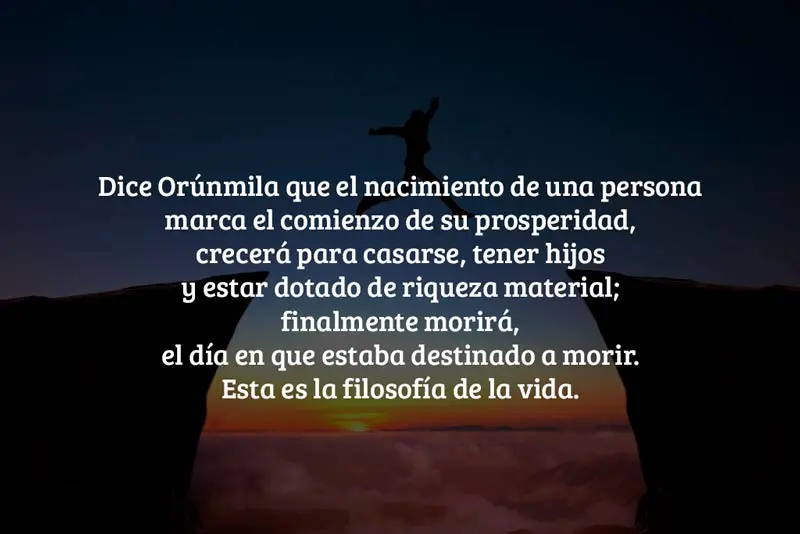
The words and teachings of Orunmila, the Orisha of wisdom and divination in the Yoruba religion, are fundamental to understanding his vision of the world and life. One of his most significant phrases reflects his perspective on the cycle of human life and his destiny:
«Orúnmila says that the birth of a person marks the beginning of his prosperity, he will grow up to marry, have children and be endowed with material wealth; He will finally die, the day he was destined to die. This is the philosophy of life."
This phrase encapsulates Orunmila's vision of human existence as a predestined cycle full of significant stages. From birth to death, every moment of a person's life is imbued with purpose and destiny. Prosperity, marriage, parenthood and material wealth are seen as natural milestones in life's journey.
Orunmila's words are a guide for his devotees, providing a structure for understanding life and its challenges. Through her teachings, she seeks wisdom and understanding to navigate life, respecting destiny and learning from each experience.
Conclusion:
The figure of Orunmila in the Yoruba religion and Santeria is a testimony to the richness and depth of these spiritual traditions. As the orisha of wisdom, divination and knowledge, Orunmila not only represents a divine aspect, but also embodies the values and principles that guide his followers in their daily lives. Through the odus of Ifá, Orunmila offers guidance and advice, helping people navigate the challenges and uncertainties of life.
The practice of Ifá, with its sacred instruments and tools, is a tangible manifestation of the connection between the divine and the human, allowing believers to access ancestral wisdom and the teachings of Orunmila. Sacred herbs, symbolic colors and special celebrations, such as Orunmila Day, reinforce the relevance of this orisha in the daily lives of his devotees.
Orunmila's syncretism with figures such as Saint Francis of Assisi in Santeria illustrates the ability of these traditions to adapt and merge with other beliefs, demonstrating the universality of their messages and teachings.
In conclusion, Orunmila is much more than an orisha; It is a symbol of the constant search for knowledge, understanding and spiritual guidance. His legacy continues to influence the lives of many people, offering a path to wisdom and understanding in a world full of uncertainty and change.

How can we download material….and it would be nice to add some prayers… For the rest, excellent work!!!